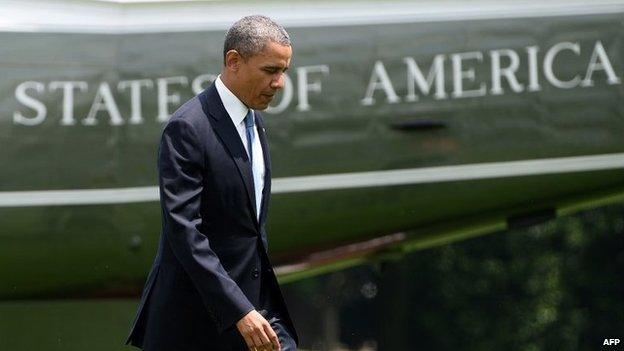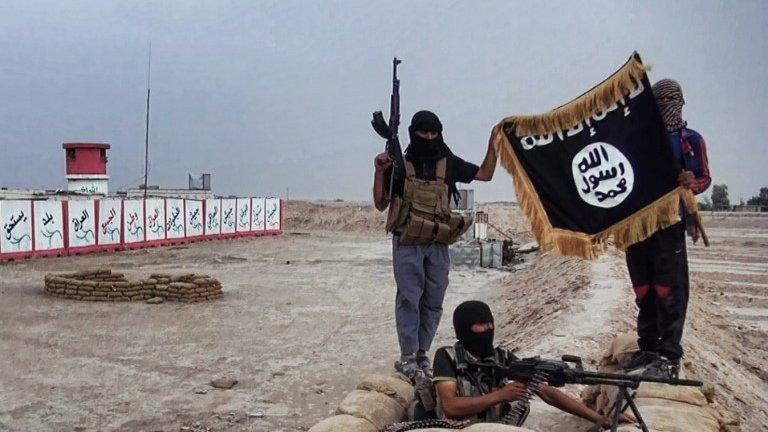Is Obama right over Iraq?
- Published
- comments

Not going it alone: Obama's recent foreign policy speeches have stressed regional partnerships
The Obama doctrine, set out at West Point, appears to be in tatters as Iraq falls apart. The critics have been quick to point to what's happening there as another sign of the weakness of his foreign policy.
But there is another way of looking at it. That he's right.
Here's the case for the prosecution. That in his haste to proclaim the war over, he pulled US troops before the Iraqi government was ready to go it alone.
He failed to reach a meaningful military deal with the country. He's taken his eye off the ball, done little to encourage civil society and a more balanced political solution. He has not led the world in identifying a looming crisis and crafting a coherent response.
The Obama doctrine says the US will only go to war if its vital interests or those of its allies are threatened.
Well, Iraq is an ally. A radical caliphate in the heart of the Middle East, able to harbour potential terrorists, as ever Afghanistan was, is clearly a threat to the US.
Mark Mardell's analysis: "The critics will demand real action"
Two-and-a-half years after ending the war, the US might want to impose some "shock and awe" once more. More than an irony, a failure.
But if his tactics are wanting, what about the strategy?
This is the case for the defence - although it is one that the leader of the "indispensable nation" cannot state.
US and Western intervention is unlikely to actually do much good. In fact, it created the problem in the first place.
After the first world war the imperial powers of France and Great Britain, greedy for oil, carved up the Ottoman Empire between them and created the French dominated state of Syria and the British dominated one of Iraq. The two men redrawing the map, Sykes and Picot, had little regard for what anybody on the ground felt or thought about nationality or tribe or religion.

Recent volunteers to the Iraqi Army sign-up to fight militants
The countries now "falling apart" were stuck together in the first place by outside powers.
George W Bush and Tony Blair's invasion of Iraq toppled a terrible dictator. But Saddam Hussein was a secular terrible dictator keeping a lid on forces that, unlike him, were a real threat to the US and its allies.
The pressure from below would have probably blown the lid off by now, perhaps with similar results to Syria.
Turmoil was coming anyway, and the Iraq war brought it a little sooner and laid the responsibility at Western doors, creating more resentment in the Islamic world, and fuelling extremism.
Remember this view doesn't get much of a hearing - many journalists and think tankers are liberal interventionists and believe something must been done - whatever it is.
At least, those writers are from US, France and UK. You don't hear the argument for intervention so much from, say, Brazil or Sweden.
It is clear Mr Obama has not led, and has not imposed the US's will on the world.
But it is not so clear that a firm and muscular policy would succeed any more than imperial adventures of the past.

Barack Obama: "The US will do our part, but understand that ultimately it is up to the Iraqis as a sovereign nation to solve their problems."
ADDED AT 17:15 GMT, following Obama's address on the White House lawn, in which he ruled out sending troops to Iraq and called on the Iraqi Government to unite the country...
This was not the swift deployment of military force that some critics in Washington want. But it was a tough-minded, even impatient, statement of the president's approach. As he put it at West Point, "because we have the best hammer does not mean that every problem is a nail".
He said American sacrifices had given Iraqis the chance to claim their future - but their leaders hadn't seized it. He almost mocked the Iraqi army for running away, castigated the government for not trying hard enough to overcome the sectarian divide and made it clear that the US would not be "dragged in" to a return to Iraq.
There's a world view behind this statement that some Americans and others in the West may find uncomfortable - that US military might, as great as it is, cannot impose solutions on a complex world.
Behind his words, there is the strong feeling that changing Iraq by force has already been given more than a chance. It failed. And it mustn't be repeated.
- Published30 June 2014

- Published28 May 2014

- Published29 May 2014

- Published12 June 2014
